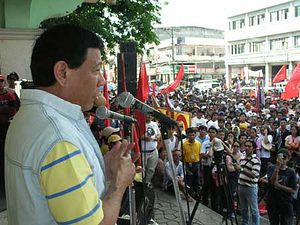Philippine President Rodrigo Duterte has repeatedly insisted that he is a leftist; a socialist but not a member of the Communist Party.
This is politically important, since no president in the country’s history has made a similar claim. Expressing support to leftist causes is quite controversial in a country where anti-communist propaganda is strong, but Duterte had no reservations in admitting his supposed leftist tendencies.
But how much truth is there to all this? Is Duterte really a leftist politician? Though scholars and activists might question Duterte’s political affiliation, what is clear is that he has close links to the Philippines’ leftist leaders and even rebel groups.
It all started during his university days, when he became a student of Jose Maria Sison, the founder of the Communist Party. The student movement during that time identified American imperialism and oligarchy as the prime evils in society. This partly explains why Duterte often rants against the colonial crimes of the United States and the rapacious motives of big business.
When Duterte was a city prosecutor in Davao City, he handled a case involving a priest-turned-rebel who would later become his political strategist. This former rebel is now Duterte’s Cabinet secretary.
While Duterte has openly praised the legacy of former President Ferdinand Marcos, his mother was actually an active participant in the anti-dictatorship struggle. Aside from opposing Martial Law, Duterte’s mother is also recognized as a respected voice in the women’s movement in Mindanao during the 1980s.
Over time, Duterte developed a reputation as a tough-talking mayor of Davao City whose top priority was winning the war against illegal drugs and crimes. His supporters praise him for making the city safe, but critics accuse him of being an unrepentant human rights violator. Less well known was Duterte’s productive relationship with civil society groups and people’s organizations, which successfully lobbied for the introduction of meaningful social reforms in Davao City.
For example, when Duterte was being pilloried in the press because of his misogynist views, he defended himself by asserting that Davao was the first city in the country to pass an ordinance guaranteeing respect for women. Close observers of local politics knew that he was right, even though this fact still seems to have gone unacknowledged by most international media outlets today.
Duterte also publicly flaunted his ties with leftist rebel groups operating in Mindanao. There were several instances when rebels would personally release captured government soldiers to Duterte. At one point, Duterte agreed to become a consultant of the National Democratic Front (NDF), an alliance of revolutionary organizations that has been engaged in a peace negotiations with the government since 1986.
Few were surprised when Duterte offered three Cabinet positions to the NDF when he became president last year. It merely bolstered Duterte’s image as a politician who is ready to work with various groups from both ends of the political spectrum.
Thanks to his long history of being friendly with the left, he was able to restart the stalled peace talks just barely two months after he assumed the presidency. He released the alleged top leaders of the rebel movement and affirmed the substantive agenda of the peace process.
The extreme left, meanwhile, also allowed itself to be more flexible in dealing with Duterte. It announced an indefinite ceasefire as a goodwill measure to resume the peace talks, and it agreed to accelerate the peace process by finalizing a peace agreement in one to two years. Duterte’s former teacher, Sison, also declared that the NDF is willing to help in establishing the Federal Republic of the Philippines. Federalism is Duterte’s rather controversial model for changing the country’s political system.
Duterte’s relationship with the left was tested when he declared an all-out war last February. This led to greater deployment of government forces in rebel-controlled territories. It also worsened the state of impunity and human rights abuses in the countryside.
But in less than a month, back-channel efforts were made to resume the talks again. The recent round of negotiations concluded with both parties agreeing to discuss a longer and more stable ceasefire in the next few months. More importantly, they both agreed that the guiding principle of the agrarian reform program is free land distribution to small farmers.
Interestingly, Duterte is never called a leftist president by his leftist allies. That is no surprise. Indeed, how could he be a leftist if his economic team is composed of free market adherents and his security cluster is dominated by anti-communist generals? Any decent leftist will also not advocate Duterte’s bloody “war on drugs.”
Nevertheless, Duterte continues to have prominent leftists in his Cabinet. He espouses an independent foreign policy, supports the suspension of destructive large-scale mines, and continues to try to keep the peace process moving forward despite the formidable challenges it faces and the slow pace of progress thus far. Recently, Duterte proved that he is an unusual politician when he stopped the police from evicting more than 5,000 poor families who occupied a vacant government housing complex.
Duterte claims that his invitation to leftists to join his cabinet is a signal that his government is inclusive. In truth, his decision to open the tend to leftists has alienated some sections of the military and other conservative political forces. If the threat of destabilization coming from these groups becomes stronger in the future, that will make Duterte’s leftist claim even more difficult to sustain.

































